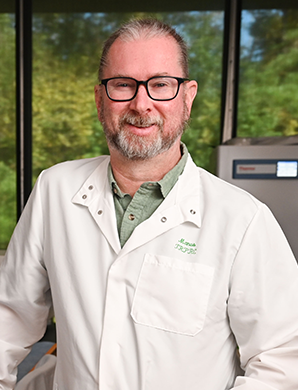Andrew MacLean, PhD
Associate Professor

Research
My group has developed novel methods for determining mechanisms of neuroinflammation, including glial activation and neurovascular unit (NVU) disruption. I have experience in examining the cell biology of neuroinflammation by developing 2D, 3D and slice cultures for analyses of neurophysiology and immunology. I have a broad background in cell biology, with specific training in and expertise in mechanisms of inflammation.
We have developed several models for examining the fundamental biology of the nonhuman primate NVU. These studies evolved through understanding the immunological necessity for using appropriately sourced endothelial cells, through confocal and electron microscopy analyses of the interactions of the brain microvascular endothelial cells and astrocytes required for a functional NVU. We have established real time models for viral neuropathogenesis.
These models were used to verify mechanisms of neuropathogenesis in HIV infection. These studies documented a central role for activation of astrocytes in the pathogenesis of SIV, and the secretion of chemokines from both astrocytes and microglia being important for the continued chemotaxis of monocytes into the parenchyma. The essential role for activation and phosphorylation of focal adhesion kinase in BBB disruption and tight junction protein organization logically lead into studies of vascular leakage. This study demonstrates that one can determine when there is encephalitis using a serum marker of BBB disruption (S100b). These studies were undertaken by graduate students (Nathan Ivey and Nicole Renner), an integral component of our function at Tulane.
Astrocytes play a key role in brain homeostasis. The intricate morphology and intimate connections with numerous cell types, including neurons makes astrocytes essential regulators of normal function, including cognition and behavior. Over the past couple of years we have investigated how innate immune activation, cytokine secretion, and astrocyte morphology is linked in a number of neuroinflammatory conditions including dengue, chikungunya and neurobrucellosis (first group to examine astrocyte activation in situ), SIV, and abnormal behaviors (by graduate students Kevin Chiu and Kim Lee). This last study is perhaps most intriguing, as it has opened avenues to study other neurobehavioral disorders. The sequential activation of multiple cell types including astrocytes will be important to discover the underlying mechanisms for these debilitating conditions.
In addition to the major contributions described above, working with a team of collaborators, I have also used my cell biology of innate immunology background to contribute to other studies. The diversity of diseases and techniques involved range from macrophage migration in tuberculosis through to the development of a novel real-time measure of T cell killing in response to an infectious agent. Glial activation is becoming recognized as a fundamental mechanism of numerous diseases: the precise morphometrics of astrocyte activation in Chikungunya was calculated, for the first time, and the role of microglia and astrocytes in globoid cell leukodystrophy was determined. I served as a co-investigator on all of these studies, and demonstrate the highly collaborative nature of TNBRC and Tulane School of Medicine.
Ongoing funded studies include:
R01 NS104016 (MacLean, A.) NIH/NINDS “Eradication of Latent SIV from the CNS”
R21 MH113517 (MacLean, A) NIH-NIMH “Exosome Origin in HIV Pathogenesis”
R01 DA040394 (Dittmer, D.) NIH-NIDA “HIV and substances of abuse influence exosomes and endothelial cell function.”
